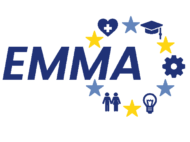Author name and affiliationn: Marvin D. Hoffland, Carinthia Univ. of Applied Sciences/FH Kärnten

Take home points:
1) It is possible to conduct effective on-line training if planned out accordingly.
2) Create a sandbox to let the participants play!
Conducting training on how to use educational learning management platforms can be quite a daunting task due to the wide variety of different user experiences of the participants in the best of situations. Now, throw in the fact that the participants are from five different universities over three different European time zones of which three universities use Moodle, one uses Canvas and one uses Open eClass. Did I forget to mention that the training is all on-line using MS-Teams and spread out over three days? In this blog, I will briefly discuss how we successfully managed to do this.
Starting at 09:00 CET on Monday, May 15 and ending on Wednesday May 17, twelve participants from EMMA project consortium attended staff teaching and training (STT) on the Moodle 4.2 LMS platform, which was hosted by the CUAS. So now let’s look at the training conducted.
On day 1, Antti Kauppila (Karelia UAS) reviewed key pedagogical concepts that are necessary in providing an online master degree program such constructive alignment, user experience, etc. This was followed by the Moodle training conducted Marvin D. Hoffland (your humble author, CUAS), which was split up into an introduction of the CUAS’s IT-infrastructure that will be used for the proposed EMMA master (Kaltura Media Server, Turnitin, Office365, Teams, etc.) and how the services are interconnected with Moodle@CUAS. This was followed up in the afternoon with actual Moodle training covering the basics (e.g., adding files, assignments, etc.) and more advanced Moodle concepts (gradebook, quizzes, question pool, H5P, etc.). These training sessions were recorded so the participants could access them during the following day’s workshop.
On day 2, the trainees from the participating universities were provided with user accounts and each respective university was provided with their own Moodle course, a so-called sandbox so they could play. But it wasn’t all play, each university was given specific tasks (add multimedia content, course materials, create a welcome video, create quizzes and assignments) and enough time to complete the tasks. I stayed online to answer questions and monitor progress in the rest of the day’s workshop phase.
On day 3, after a brief wrap-up of the workshop, each university presented their results and outlined the challenges they faced. The other teams and I gave feedback, what we liked and where we feel there could be improvements. I, as the trainer, stressed that when starting to learn and use Moodle or other e-learning tools is to experiment and try new things. If the outcome is not what was desired, simply delete it and try again. In particular, the participants liked the sandbox area where they could try new things in a safe environment.
As the EMMA master is scheduled to start in the Winter Semester of 2024, staff and teaching trainings like this are absolutely vital to ensure that all staff are in the position to provide high quality teaching material that are student focused. Moreover, a uniform approach and online course design need to be developed in advance between the various universities in order to provide the future students a homogenous, efficient and transparent learning management system.


